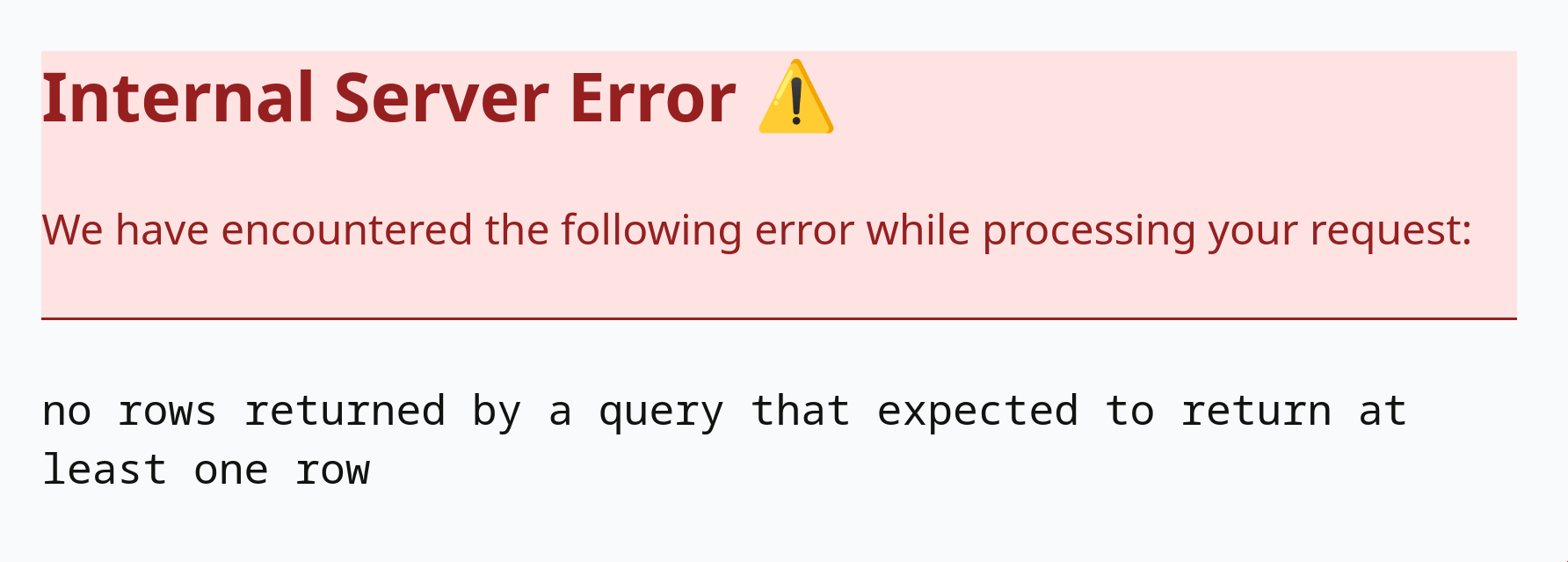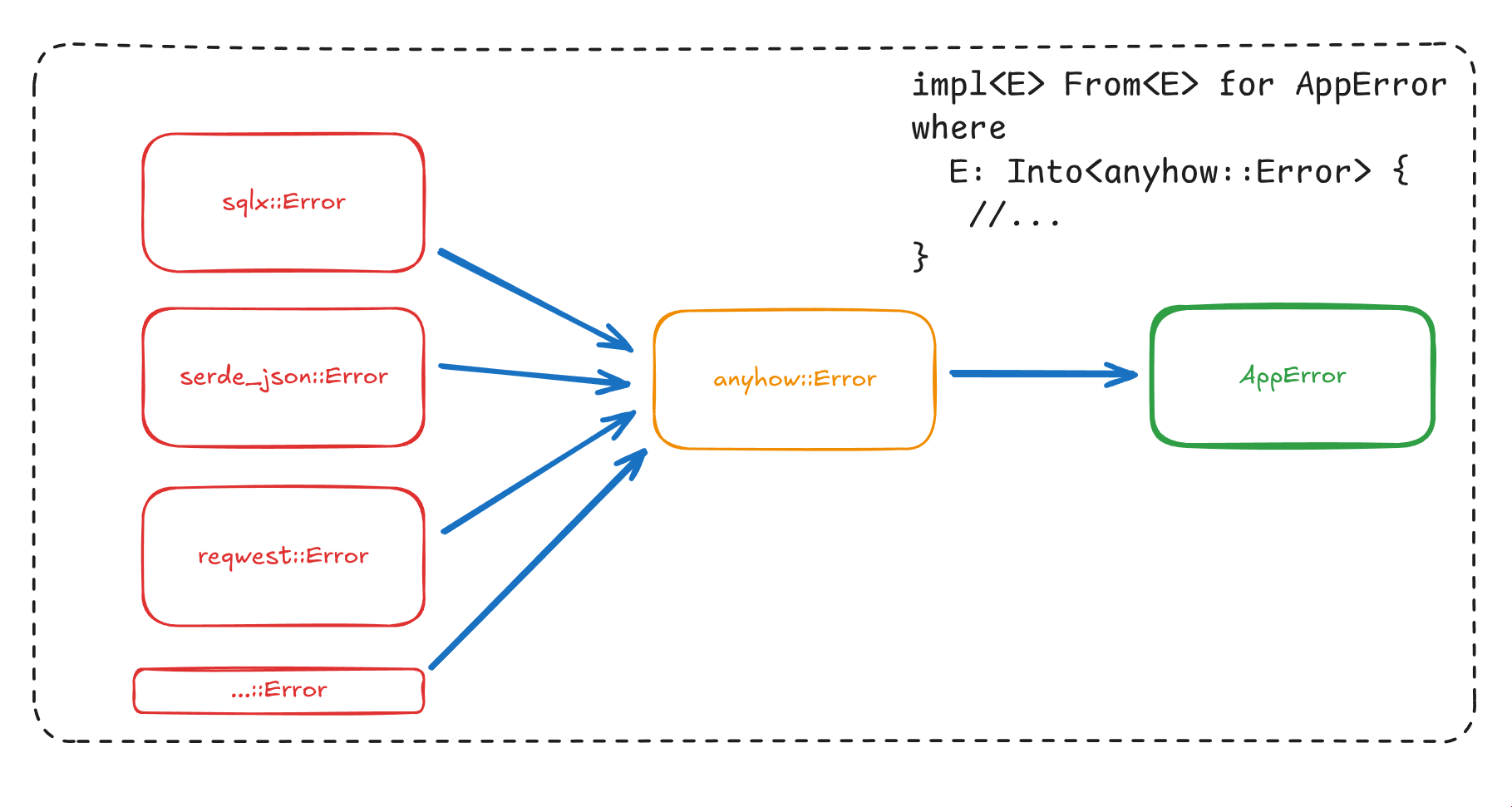TL;DR: GITHUB REPO. Tired of writing the same verbose error handling boilerplate in your Axum handlers? Me too! 🙄 By creating a custom
AppErrornewtype that wrapsanyhow::Errorand implementsIntoResponse+From<E>, you can ditch all those ugly match statements and embrace the beautiful?operator. Your handler functions go from messy error-matching shenanigans to clean, readable code that automatically converts any error into proper HTTP responses. It’s like magic, but with more crabs! 🦀
Recently I’ve been digging a lot into the axum crate for any of my Rust web projects. There are plenty of options out there for Rust web applications, but it seems that we have all settled on Axum as the go to crate. Before you even start reading this, if you have not checked it out yet - do so now … I’ll wait.
Okay, you’re back! Love it? YES! 🥳 Now, let’s talk about a learning project I am working on. Ever since I’ve discovered htmx I’ve been immersing myself in the world of web development with HATEOAS as my priority. Just the neatness of using hypermedia gives me a rush, and helps me with all that JavaScript fatigue. I do suggest you go and give hypermedia systems a read, a thing I have been doing over the past couple of weeks.
So, in the spirit of this book, I was following along with building some hypermedia driven system. But instead of using Python and Flask as stated in the book, I’ve opted to put my crab hat on, and do it in Rust. Like the big boy I am. In this post I wont explain how I did that (link to a post from the future will go here), but rather explain how I used the amazing features of Rust to eliminate a lot of boilerplate code on my side.
In order to be a good web builder, you want to make sure to return the proper HTTP status codes. (I’m looking at you 200 OK with an error message). So in my handler functions I make sure to explicitly return the Status code as part of my return tuple. Something like so:
Ok((StatusCode::OK, Html("<h1>Hello World</h1>")))
// Or an Error:
Err((StatusCode::INTERNAL_SERVER_ERROR, format!("Error processing hello world")))This would signal back to the user (and axum) that the request was either 200 OK, and here is the HTML, or 500 Internal Server Error and an angry string. Nifty!
With the glory of Rust’s Result enum, we are equipped to handle any errors our back end may throw at us. So, I just match on call that can fail, and return something back depending on that Result.
In practice, say in this handler function that finds a Contact by its ID in the database, it would look something like this:
#[axum::debug_handler]
async fn get_edit_contact(
State(state): State<AppState>,
Path(id): Path<i64>,
// The function signature tells us what we expect back
) -> Result<(StatusCode, Html<String>), (StatusCode, String)> {
// This call can fail so let's match its Result
let contact = match Contact::find_by_id(&state.db, id).await {
// We're good return back the `Contact` into the `contact` variable
Ok(contact) => contact,
// We're NOT good, return the tuple with a status code of 500
Err(e) => {
return Err(
(
StatusCode::INTERNAL_SERVER_ERROR,
format!("Failed to find contact: {e}")
)
)
}
};
let edit_template = EditContactTemplate { contact };
// This can also fail, but we dont need to store it into a variable,
// we just need to return.
match edit_template.render() {
// Looks good, return the HTML and 200 OK
Ok(html) => Ok((StatusCode::OK, Html(html))),
// Again 500 Bad, be angry here
Err(e) => {
Err(
(
StatusCode::INTERNAL_SERVER_ERROR,
format!("Failed to render template: {e}")
)
)
}
}
}That is a lot of boilerplate code. While I do enjoy the verbosity of Rust (makes me feel all safe and cozy), this gets real old real fast. Especially when you have multiple handler functions, that invoke multiple different calls that can fail. Let’s bring in another amazing feature of rust the newtype pattern, and simplify this 👏
I wont go too much into newtypes, as there is an excellent guide that I encourage all of you to read. Simply put, they are thin wrappers that allow you to extend functionality of existing Types not native to your crate. And I am gonna use it to extend the implement the IntoResponse trait into a type I dubbed AppError. And then allow it (what ever the Error is) to be converted into anyhow::Error.
Let’s first create this wrapper newtype:
pub struct AppError(anyhow::Error);Here I am wrapping anyhow::Error into a new type called AppError. I could do the same for any other type, and just create a wrapper around it (ie. a Vec<T> wrapper: struct Wrapper(Vec<T>)). Now comes the fun part, implementing certain traits.
To implement the IntoResponse trait from axum into this new type, we only need to implement the into_response function, which needs to return a Response<Body> type. Let’s look at some code:
impl IntoResponse for AppError { // 1
fn into_response(self) -> Response { // 2
(StatusCode::INTERNAL_SERVER_ERROR, self.0.to_string()).into_response() // 3
}
}And just like that we’ve implemented our own way of returning an error response from a handler function. Let me explain the code a bit:
IntoResponse for AppErrorIntoResponse and we are simply returning a Response from the axum crateStatusCode and a String coming from element 0 of the AppError struct. Oh, and convert all that into a ResponseHere is a bit more complicated version of the same code, this one uses a templating engine to return some nicely formatted web pages. This version just expands the above, but should demonstrate that this all works really nicely with the rest of your codebase.
impl IntoResponse for AppError {
fn into_response(self) -> axum::response::Response {
// Returning a HTML page for an error
let template = Error5xxTemplate { // 1
// Select element 0, as that is our anyhow::Error string and convert it so it works with our template
error: self.0.to_string(),
};
match template.render() { // 2
// If the template render is successful, return the HTML page with the error
Ok(html) => (StatusCode::INTERNAL_SERVER_ERROR, Html(html)).into_response(),
// The render has failed catastrophically - just return some string
Err(_) => (StatusCode::INTERNAL_SERVER_ERROR, "Internal Server Error").into_response(),
}
}
}Okay, there is a lot more going on here. Most of it is the same as before, but let me break it down:
Error5xxTemplate struct that I use with the askama templating crate500 error and the string back.
Now that we have an IntoResponse implemented. Let’s give our AppError the ability to take errors from anywhere.
To make AppError a bit more flexible, I wanted to be able to automatically convert any* (*I’ll come back to this in a bit) error type. Let’s look at some code and make sense of it:
impl<E> From<E> for AppError // 1
where
E: Into<anyhow::Error> // 2
{
fn from(err: E) -> Self { // 3
Self(err.into())
}
}We are taking advantage of a very powerful crate here, anyhow. Which allows us to work with errors in Rust way more efficiently. In our case we are using it’s popularity and other crates ability to convert into this Error type.
Let me explain this line by line:
From<E> for AppError. By using the generic type E we can have a wider implementation. This would be the equivalent of impl From<sqxl::Error> for AppError. Which converts the sqlx::Error type into AppErrorwhere clause, we only allow the generic type E to be the ones that already support the Into trait from anyhow::Error. Basically limiting us to types that already support the conversion into this error type.from function that takes an error and returns itself back. By using the support mentioned above, we can just take the error and run an .into() conversion.By using this generic trait approach we are essentially creating the following Rust code:
// SQLX:
impl From<sqlx::Error> for AppError {
fn from(err: sqlx::Error) -> Self {
Self(err.into()) // sqlx::Error -> anyhow::Error -> AppError
}
}
// serde_json
impl From<serde_json::Error> for AppError {
fn from(err: serde_json::Error) -> Self {
Self(err.into()) // serde_json::Error -> anyhow::Error -> AppError
}
}
// reqwest
impl From<reqwest::Error> for AppError {
fn from(err: reqwest::Error) -> Self {
Self(err.into()) // reqwest::Error -> anyhow::Error -> AppError
}
}
// ...And so on … You get the picture!

Okay, so we have our newtype AppError, it has all the things it needs to be converted to our Error type. How does it actually work? Well, let’s go back to our get_edit_contact handler function from before, and see what has changed:
#[axum::debug_handler]
async fn get_edit_contact(
State(state): State<AppState>,
Path(id): Path<i64>,
) -> Result<(StatusCode, Html<String>), AppError> {
let contact = Contact::find_by_id(&state.db, id).await?; // sqlx::Error -> AppError
let edit_template = EditContactTemplate { contact };
let html = edit_template.render()?; // askama::Error -> AppError
Ok((StatusCode::OK, Html(html)))
}Whoa, that is way tighter than before. Yes, we are using the ? operator we propagate the errors up the call stack. Meaning the value of the Result returned by both Contact::find_by_id and .render() are returned back to axum as AppError newtypes.
This means we no longer have to deal with error handling within the function itself, and we are just returning the same error type back. Since it is the same error type, both function handler and axum are happy with receiving it! 🥳 Huzzah!
If you want to see the full codebase in action, you can check out my GitHub repo here. And please ignore the mess, this is just a learning repo! 🙏